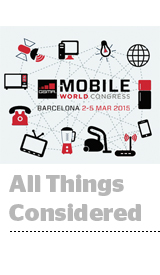 On Monday, more than 90,000 tech vendors, manufacturers, marketers, agency reps, carriers, analysts, reporters and sundry members of the C-suite from more than 200 countries descend on Barcelona for Mobile World Congress with a single acronym on their lips: IoT — The Internet of Things.
On Monday, more than 90,000 tech vendors, manufacturers, marketers, agency reps, carriers, analysts, reporters and sundry members of the C-suite from more than 200 countries descend on Barcelona for Mobile World Congress with a single acronym on their lips: IoT — The Internet of Things.
But connected cars, smart washers, chatty fridges, intelligent garage doors and the latest generation of phone, fitness bands, watches or other various wearable devices aren’t the real battleground, said former Mediacom mobile chief Jon Hook, who moved over to app dev startup Phunware as VP of mobile in January.
“It doesn’t matter what the big trend is – it’s the simple question of what connects all of these wearables, mobiles, beacons, NFC and advertising solutions,” Hook said. “Without that, all you have are great innovation, advertising and mobile partnerships sitting in isolation. What’s the tech or the software quietly working in the background to connect all of this?”
Samsung, HTC, LG and Sony are all reportedly unveiling flashy new devices at MWC this year. While certainly cool, announcements like that are more of a distraction than anything, said Neil Sweeney, president and CEO of JUICE Mobile and its beacon network spinoff company, Freckle IoT.
“Handsets are completely irrelevant. People will fixate on phones, but they should be focused on the operating system powering them,” Sweeney said. “Use the auto sector as an analogy: What sells a car today? It’s not horsepower, it’s technology. Horsepower is a commodity. It’s about interconnection and understanding how mobile influences the development of the cars you’ll be seeing in the lots going forward.”
An app experience that begins on a phone, doesn’t end on a phone, at least not anymore, said Michael Katz, founder and CEO of mobile data startup mParticle.
“What happens on your phone expands to your wrist, into your car, onto your wall through your connected TV – and there’s a massive opportunity to capture data from all of these various app-based environments, but marketers need tools to leverage and harness the value of that data,” Katz said. “As the importance of browsers becomes diminished, the tools they’ve been accustomed to using in the web environment, things like pixels and cookies, are no longer relevant. They need to be reimagined.”
Reimagined for a world in which contextual awareness and location targeting – even predictive location targeting – is becoming the norm.
“It really is the ultimate nirvana for marketers and requires coordination across service providers, application providers and brands to increase the impact of mobile,” said Dan Hays, a principal at PricewaterhouseCoopers focused on mobile strategy and ops.
That’s part of what’s informing the industry’s shift toward identity-based ad serving and ID-based ad solutions, as evidenced by the relaunch of Facebook’s Atlas in September. Google is undoubtedly cooking up an identity-based solution of its own.
“Our job as marketers is to see the person – not just the profile – in the data,” said Matt Mulderink, SVP of mobile, social, product and partnerships at Starcom MediaVest Group. “Data sharpens our portrait of the consumers and the experiences we deliver to them. Together with technology, data is powering addressable and precise connected experiences – and mobile is the center of it all.”
As Elizabeth Harz, president of media at travel data company ADARA, pointed out, mobile measurement is also key. According to eMarketer, almost 40% of advertisers have no way to measure monetization for ad campaigns in the mobile channel. Cross-device attribution might not be as outwardly sexy as the newest Samsung device, but it sits, or should sit, at the very top of the marketer’s to-do list.
While Mobile World Congress used to be a B2B-centric show, more about cell tower technology than consumer-facing product, it’s evolved into a European version of CES. For the first time, there was an entire conference hall dedicated to mobile ad tech last year.
“Marketers know how important mobile is becoming for people and, therefore, their businesses,” said Matt Kershaw, VP of client strategy at mobile ad platform RUN, which was acquired by Publicis Groupe in October. “Getting close to the epicenter of the mobile conversation can only help marketers’ comfort level, which in turn increases their understanding of consumer behavior and, thus, their willingness to spend more of their ad dollars in mobile.”
Phunware’s Hook can attest to that.
“Every brand I’ve taken out to MWC in my agency days has come back and the penny has dropped,” he said. “It’s never about ‘selling’ mobile, it’s about them going to MWC, seeing where the market is and where it’s going. They see the technology coming to life on the stand and they can see the product demos.”
Speaking of, it’s more than okay to revel in the next-gen tech on display at MWC as a member of the mobile cognoscenti – because there’s only so much time before it hits the mainstream.
“We’ll see innovations around connected homes, connected cars, wearables – and a lot of these things seem abstract, like we should talk about them in the future tense,” said JUICE Mobile’s Sweeney. “But you’d be surprised how often the things that get introduced in beta at a show like Mobile World Congress end up materializing at the back end of the year or, more specifically, at CES next year.”












